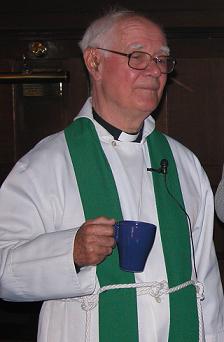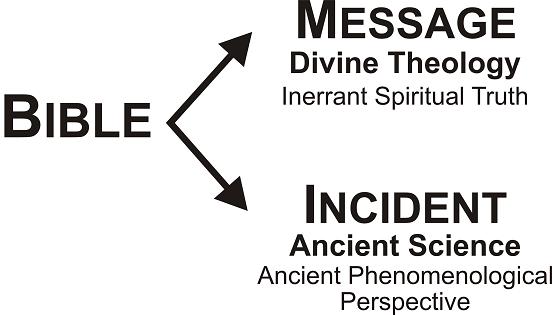
Every Monday, “Science and the Sacred” features an essay from one of The BioLogos Foundation’s co-presidents: Karl Giberson and Darrel Falk. Today’s entry was written by Darrel Falk.
Some time ago, I spoke with a theologian who has accepted the findings of the physical sciences–the earth is 4.5 billion years old–but not the biological sciences. Macro-evolution, he believes, is an illusion. Instead life arose through a series of sudden creation events. Near the end of our discussion he summarized his advice to me: “You folk who take a gradual creation point of view have much work to do on your theology,” he said. What he meant is that if life arose by a gradual process, none of the old theology works anymore. I am convinced he is wrong about that. Today, though, I want to focus on the great deal of harm created by propagating the view that evangelical theology falls apart if God created through natural selection and macro-evolution. It is statements like that which cause huge faith crises when believers discover that not only are the physical sciences correct, but the biological sciences have it right too.
Consider, for example, the story of Anthony outlined in his autobiographical essay which is posted at a blog-site for former Christians. Anthony had little room for mystery in his theology. Everything had to be nailed down tightly and he built his life around being-in-the-know about everything related to God. When he found that his tight theology didn’t mesh with the facts, he thought he had no choice but to give it all up. So steeped was he in a theology where all the pieces had to fit together, that when he found some which didn’t, there was nothing left for him except atheism itself. So Anthony, a former believer who wanted nothing more than to know God, has now decided that there is no God; he has rejected all faith, and he is a regular contributor in the comments section of atheistic blog-sites. There are likely thousands like Anthony, people who no longer think they can have a relationship with their Creator because they find pieces that don’t fit into their once-neat theology. It is we evangelicals who ought to share the blame for their fate. Like my friend the theologian, we have left the impression that there is no choice: accept a theology where all the pieces are in place or live life in total alienation from that which matters most of all–the life lived in relationship with one’s Creator.
The biblical account of Job is a fascinating story about theology. Job is shown to be a righteous man, but some things happen which don’t fit with his theology and he gets very frustrated. His three friends come along and, through the lens of their own inadequate theologies, they try to explain Job’s current circumstances to him. They fail miserably. Having received no consolation, Job feels even more betrayed and even more alone. Finally, God comes alongside of Job and speaks to him. God helps Job recognize the level of his ignorance about theology. The story ends on a magnificent note with Job joyfully celebrating his life in God. The fact is, however, that God had not answered Job’s theological question. God never put the missing puzzle-piece in place for Job. So what set Job’s mind at ease and drew him into worship? Job, recognizing for the first time that God is “wholly other,” became humble about his own theological skill in addressing the matter at hand. He sums this up in one of the most profound statements in all of Scripture: “Surely I spoke of things I did not understand, things too wonderful for me to know…my ears had heard of you but now my eyes have seen you.” (Job 42:3,5). What did he see for the first time? Job, for the first time, had come to see that the ways of God are infinitely greater than his own puny mind can comprehend. Job came to see that theology–to be meaningful–needs to be shrouded in mystery. With that, Job experienced peace, and for the first time, really came to know God.
Theology is at its best when it does not try too hard to nail down every loose end. It really thrives when it acknowledges mystery. Theology is at its best when it pushes as hard as it can push within the context of scripture, tradition, experience (including data from the world around us), and reason. But good theology must always leave room for the fact that we see “through a glass darkly.” Theology is at its finest when it realizes, like Job, that to really see God is to see mystery.
Anthony left his faith not because he discovered that evolution was a fact, but because he saw that the theology on which he based his life, a theology which required that every single piece be in place, didn’t work. Anthony was like Job. He had pieces that didn’t fit into his puzzle. Unlike Job, however, when those pieces didn’t fit, he reached the conclusion that the puzzle had to be thrown out. Unlike Job, he was unable to humbly admit that we humans don’t know enough to construct picture-perfect puzzles.
We must be content to work on puzzles with missing pieces or pieces that have crooked edges that prevent snug fits. Once we humbly recognize the incompleteness of our picture, it opens up a whole new world and it frees theology to build a picture that not only “hears of God”, but actually “sees” that our understanding of God must always be steeped in a deep sense of the mysterious.
So is it our task to lay out a theology that neatly shows why evangelical Christianity still makes sense in the face of the reality of macro-evolution as my friend insisted? I think the days of nice, neat theologies that answer all the questions and hold together with perfect cohesiveness disappeared with the end of the enlightenment period. The humility of Job needs to rule the day now. If, through our very human eyes, we have really seen God, then like Moses, we’ll recognize that all we’ve actually been able to see is a glimpse of the back of God while remaining protected in a rock-cleft while God passes by. If through our very human comprehension, we have really seen God, then like Elijah at the mouth of his cave we’ll recognize that all that we’ve really experienced is a “gentle whisper” that gives us little hints of what God is truly like. If, through our very human understanding, we really have seen God, we’ll realize that we’re actually like little children sitting at the feet of a great God who tells us that there is no other way to enter the kingdom but to become children, especially when we’ve fooled ourselves into thinking we’re adults. Finally, if we really seek the wisdom and understanding that comes from God, we’ll find like the apostle Paul that it rests in love, and not in a puzzle where all the pieces fit together.
There is much at stake. Young people, countless numbers of young people (and older people too) are coming to understand that the data is much stronger than they were led to believe. Our task is to help them see that a theology that lays out every detail is not a theology grounded in the Bible. The Bible teaches us to wrestle hard with the great theological questions of the day, but at the end of that day our greatest calling is “to walk humbly with our God.”
Darrel Falk is a biology professor at Point Loma Nazarene University in San Diego and co- president of The BioLogos Foundation.

